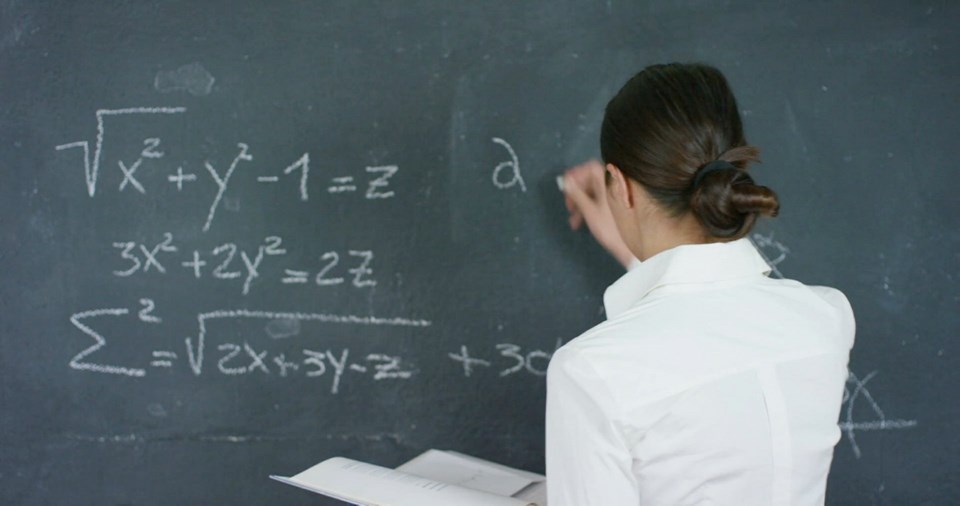My high-school math teacher was influential in shaping the rest of my life. His goal, it seemed to us, was to continually reinforce the idea that mathematics was a field of knowledge reserved for vastly superior intellects (like his) and certainly not for lower-order intelligences (like ours).
The result of years of this was a lifelong avoidance of any understandings involving math.
That continued until recently, when I was observing a secondary-education teacher trainee as she led a class through the mysteries of algebraic simultaneous equations.
It was clear that to her, nothing could be easier or more delightful than balancing an equation. She successfully communicated this to the class — and to me. It was fun.
I wondered: “How did I miss out on this? It really is interesting.”
Unfortunately, math and teacher training in math has become, in recent years, something of a political football. In Ontario, the teaching of math has become an “issue,” driven, as always, by results on standardized tests.
Just half of Grade 6 students met Ontario’s standards for math in provincially administered tests for the 2016-17 academic year, down seven percentage points from 2013.
Ontario’s mean score was 508 in 2010, and 507 in 2016, a difference the report said is not significant. That was slightly below the countrywide average of 511.
Make what you will of those numbers, but the immediate reaction from Ontario’s newly elected right-of-centre government was — you guessed it — a call for a “return to the fundamentals” without any elaboration of what that meant.
In addition, Ontario is going to become the first province to implement a math test for student teachers. Hopefully, this “training” will also include the importance of conveying positive attitudes to math.
So let’s back up for a minute and consider what exactly we are talking about. Let’s understand the distinction, for example, between arithmetic and mathematics.
Arithmetic know-how, or lack of it, is what worries most parents. Arithmetic is just one branch of mathematics, mostly involving basic techniques of calculation with numbers. When you add, subtract, multiply, divide, take square roots, some geometry and determining areas, you’re doing arithmetic.
Arithmetic is mostly what we are talking about when we talk about “fundamentals.”
My father, due to family circumstances, left school to begin work at age 13. Nonetheless, he was a whiz at mental arithmetic, and made sure I could multiply 13 x 11 (143) at the drop of the proverbial hat. No problem — you add the numbers and stick it between the one and the three. Works, more or less, for any multiple of 11 from 10 and up.
Dad had tricks like that, ways to jazz up the fundamentals and make them “amaze your friends” arithmetic fun. Learned them while keeping accounts for a bookie.
Mathematics, on the other hand, is what put a robot on Mars. Serious stuff.
Mathematics is, according to a variety of definitions, the science of numbers and their operations, interrelations, combinations, generalizations and abstractions, and of space configurations and their structure, measurement, transformations and generalizations.
Real mathematics is well beyond most of us, although we admire actuaries, engineers, economists and various scientists whose careers are based on complicated mathematical expertise.
But that young teacher trainee I mentioned, like my own dad, had the knack of making math sound easy, possibly even fun.
Unfortunately, and to the dismay of “back to the basics” parents and others, the B.C. math curriculum does not sound like much fun at all — not to parents and probably not to many teachers:
“For each area of mathematics in kindergarten through Grade 9 (K-9) [there is] computational fluency, number, patterns and relations, spatial sense, and statistics and probability. In each of these, specialized learning builds on the K-9 progression of skills and concepts.”
That reminds me of my high-school teacher who, as I said, had the knack of making math sound like a post-doctoral dissertation.
The “fundamentals” that everybody wants revisited simply include, according to most definitions, adding, subtracting, multiplying and dividing large numbers. No biggie — just needs practice and a teacher who understands the “fun” part of “fundamentals.”
The bottom line is that basic mathematics, arithmetic fundamentals and all, is only as difficult as we choose to make it for kids, ourselves and those folks who train teachers to teach math.
John Von Neumann, generally regarded as the foremost mathematician of his time said: “If people do not believe that mathematics is simple, it is only because they do not realize how complicated life is.”
Geoff Johnson is a former superintendent of schools.



